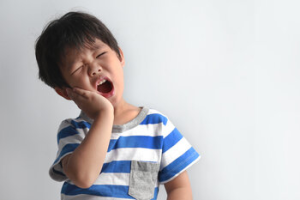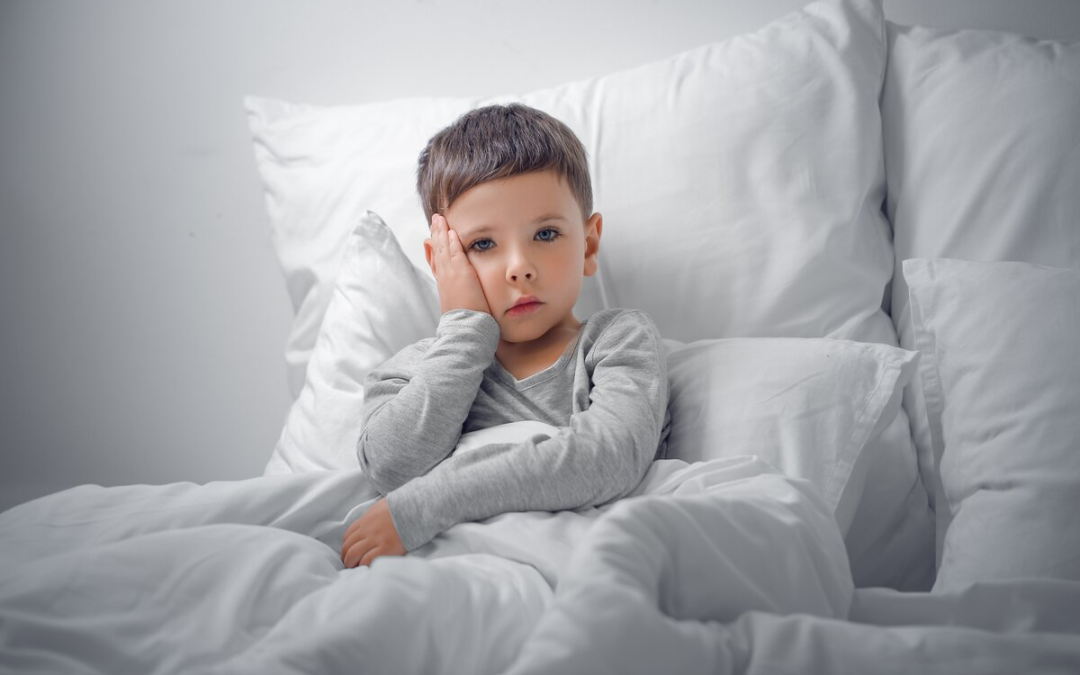As a parent, you’re always looking out for your child’s well-being. So, when you hear unusual grinding noises from your little one’s room at night, it’s natural to feel concerned. You may wonder if this is normal or indicates an underlying health issue. Kids grinding teeth in sleep, also known as sleep bruxism, is a relatively common condition that can have various causes and possible effects on a child’s oral health.
Understanding Sleep Bruxism
Sleep bruxism, a sleep-related disorder, prompts jaw clenching and teeth grinding during slumber. This condition is not age-specific, but it’s more common in children, particularly those younger than 11. This grinding action results in a forceful meeting between the upper and lower teeth, leading to various effects.
Depending on how often and how intense the grinding is, these can range from being entirely harmless to potentially harmful. Keep in mind that most children naturally leave bruxism behind as they enter their teenage years, and in numerous instances, treatment isn’t necessary. Yet, some instances can bring about a sore jaw, headaches, and possible teeth damage.
Why Do Children Grind Their Teeth?
The precise origins of sleep bruxism in youngsters remain somewhat of a mystery. Still, a collection of factors are believed to trigger teeth grinding in children. These can include emotional states such as stress and anxiety, physical conditions like misaligned teeth, and specific medical conditions – including cerebral palsy, autism spectrum disorder, and attention deficit hyperactivity disorder.
Additionally, external influences such as ear infections might also spur teeth grinding, as the discomfort from the infection can trigger a grinding response. Obstructive sleep apnoea, a condition causing irregular breathing during sleep, can also lead to bruxism.
It’s worth noting that on occasions, children may grind their teeth as a primal response to pain – this is often observed during periods of teething or when experiencing an earache, as the grinding motion can offer some relief from these discomforts. In some cases, the grinding could be a habit or response to the feeling of the baby teeth and permanent teeth.
Symptoms and Diagnosis of Bruxism in Children
To determine if your child has sleep bruxism, listen for grinding noises when your child sleeps. An older child might also complain about a sore jaw or morning pain. Other signs include:
- Sensitive teeth
- Unusual wear on the teeth
- Damage to the tooth enamel
- Chipped enamel
If you suspect your child may have bruxism, a dental checkup can confirm this. During a dental visit, the dentist will conduct a thorough assessment of your child’s teeth and jaw, looking out for indications of bruxism. These signs could include unusual tooth wear, sensitivity in jaw muscles, or damage to the tooth enamel.
In certain instances, if the dentist observes potential signs of a sleep disorder like sleep apnoea, they might refer your child to a sleep medicine specialist for an in-depth evaluation. One of the steps could be polysomnography, a sleep study used to confirm such diagnoses.
Managing and Treating Bruxism in Children
 If your child’s teeth grinding is not causing any adverse effects, treatment might not be necessary, as most kids outgrow bruxism. However, treatment may be required if the bruxism is severe or linked to another health condition, such as a sleep disorder.
If your child’s teeth grinding is not causing any adverse effects, treatment might not be necessary, as most kids outgrow bruxism. However, treatment may be required if the bruxism is severe or linked to another health condition, such as a sleep disorder.
For some kids, treating the underlying cause, such as misaligned teeth, can help. In such cases, a dental procedure might be recommended to align the teeth properly. Basic stress relievers like a warm bath before bed or reading a comforting book might help if the grinding is due to stress or anxiety. Behavioural therapies can also be beneficial in reducing stress and anxiety levels.
A dentist might recommend a special night guard if tooth damage is a concern. This dental appliance, worn while sleeping, can help defend the teeth from the effects of grinding. It’s custom-made to fit your child’s mouth, ensuring comfort and effectiveness.
Effects of Teeth Grinding on Children’s Oral Health
When your child grinds their teeth in their sleep, the effects can go beyond mere noise. Persistent grinding can result in various oral health problems, particularly if left unchecked over time. Understanding these effects can provide further impetus to seek dental advice and consider the appropriate treatment.
While many kids grind their teeth with no lasting effects, others might experience a gradual wearing down of the tooth enamel, a layer covering the surface of the teeth. In severe cases, this could lead to chipped or flattened teeth. Grinding can also cause teeth to become sensitive, particularly to hot and cold foods, affecting your child’s eating habits.
It’s important to note that these effects are typically associated with persistent and severe grinding. Most children who grind their teeth will not experience these effects, particularly if they naturally outgrow the habit before significant damage occurs.
Teeth Grinding and Jaw Disorders
Beyond the teeth, the impact of bruxism can extend to the jaw. Consistent grinding can strain the jaw muscles, leading to soreness and discomfort in the jaw area. Over time, the pressure exerted during grinding might lead to Temporomandibular Joint Disorder (TMD), a condition affecting the joints connecting the jawbone to the skull. Symptoms of TMD include jaw pain, difficulty chewing, and a clicking or popping sound when moving the mouth.
Again, these conditions are most commonly associated with severe and persistent cases of bruxism. Regular dental checkups aid in identifying any early signs of these conditions and allow for timely intervention.
The Connection Between Teeth Grinding and Sleep Quality
We often overlook the role of kids grinding their teeth in sleep and how it could disrupt their quality of rest. For some kiddos, the grinding process can interrupt their slumber, causing daytime fatigue and decreased concentration. Consequently, their mood, behaviour, and school performance can take a hit.
We’ve touched on how sleep bruxism may interlink with other sleep disruptions, such as sleep apnoea. Kids dealing with sleep apnoea face inconsistent breathing patterns during their sleep, which not only hampers their rest but can also lead to additional health concerns.
Psychological Impact of Teeth Grinding
While the physical impacts of teeth grinding are often discussed, the psychological impacts should be noticed. Children who grind their teeth may experience anxiety or embarrassment, particularly if they’re made aware of the noises they make while sleeping. If the grinding leads to discomfort or dental problems, this can also cause distress and impact their overall well-being.
Preventative Measures

While you may not be able to completely stop your child from grinding their teeth, you can take measures to minimise the potential impacts. Encouraging good oral health practices, such as regular brushing and flossing, can help to maintain strong and healthy teeth. A balanced diet containing ample calcium and vitamin D can also contribute to dental health.
If your child’s teeth grinding is caused by stress or anxiety, establishing a relaxing bedtime routine can help. This might include reading a story, listening to calming music, or taking a warm bath. Encouraging open communication can also help them express worries or fears, which might alleviate teeth grinding caused by stress.
Teeth Grinding in Kids: When to Seek Help
Remember, while it might be unnerving, the occasional sound of your child grinding their teeth is actually pretty common and generally no reason for worry. Most kids naturally grow out of this habit without any lasting impact on their oral health.
But if your child continues to grind their teeth regularly, if they seem uncomfortable, or if you spot any signs of dental damage, it’s wise to chat with a dentist. A dentist can look closely at your child’s oral health, spot any signs of grinding, and suggest the best course of action if needed.
Being alert to the symptoms and possible effects of teeth grinding empowers you to safeguard your child’s oral health, ensuring their little chompers stay strong and healthy. Whether your child’s teeth grinding is just a passing phase or a habit that extends into their teenage years, regular dental check-ups are key to keeping an eye on their oral health and dealing with potential issues swiftly.
In Conclusion
It’s not unusual for kids to grind their teeth in their sleep; most will outgrow it. But keeping up with regular dental check-ups is still crucial for keeping an eye on the situation and ensuring it’s not causing any dental woes or discomfort.
If you’re worried about your child’s teeth grinding, feel free to speak with a dental professional. Catching and managing it early helps prevent possible dental problems and keeps your child’s smile looking healthy and bright.
At Dental Excellence, we get it — hearing your child grinding their teeth at night can be unsettling. That’s why our dedicated team of seasoned professionals is here to provide the highest level of care for your child’s dental needs. Book a consultation today, and let us help safeguard your child’s beautiful smile.
References:
https://kidshealth.org/en/parents/bruxism.html
https://pubmed.ncbi.nlm.nih.gov/18180045/

